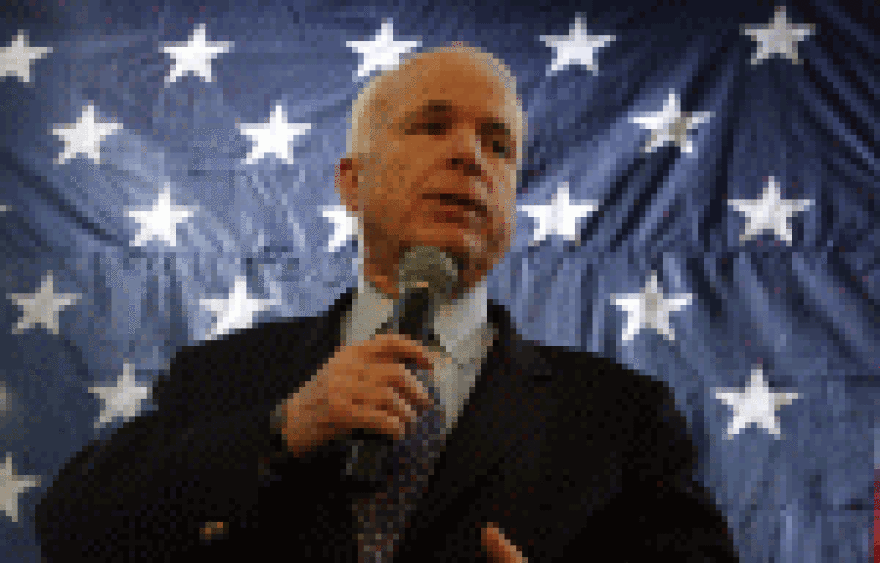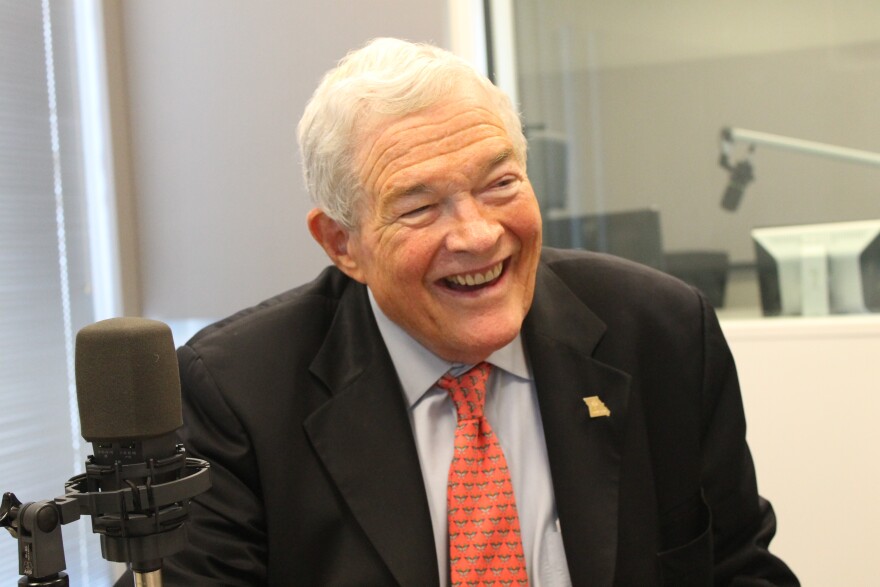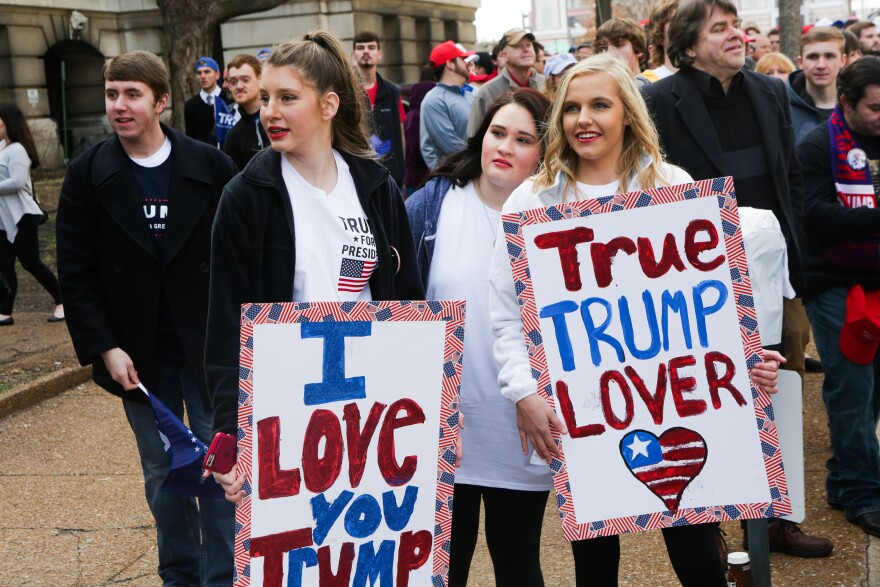It would be a big stretch to say that Hillary Clinton and Donald Trump pulled off yuge victories in Missouri’s presidential primaries. As of Wednesday morning, the pair's apparent wins are so small that the Associated Press has refrained from declaring either presidential contender the winner.
But for now, Clinton and Trump are the toast of Missouri. And barring some sudden change, the results will have a different effect for each candidate.

For Trump, he’ll likely take a good chunk of Missouri’s delegates along on his unconventional and front-running presidential run. And Clinton’s win avenges a tight loss to then-Sen. Barack Obama in 2008, even though she’ll likely split the number of delegates with U.S. Sen. Bernie Sanders of Vermont.
We may never know what singular factor drove 1,555 Democrats to vote for Clinton or why 1,636 GOPers cast their ballots for Trump. (The difference in votes as of 2 a.m. Wednesday.) And talk of a recount is premature, as votes will not be certified for weeks. But from a cursory look at the numbers, we can at least take some educated guesses:
Trump won in John McCain Country
It’s hard to think of too many commonalities between Trump and former GOP presidential nominee John McCain. Lest we forget how Trump got into quite a bit of hot water when he crassly dismissed the Arizona senator’s heroism during the Vietnam War.

But Trump wouldn’t have won on Tuesday without getting more votes in Missouri counties that McCain prevailed in during his 2008 presidential campaign than his nearest competitor, U.S. Sen. Ted Cruz of Texas. Trump got about 15,000 more votes than the Texas senator in those counties -- which was more than enough to win.
The reason for that result? Trump did better than his rivals throughout the St. Louis region, carrying places like the city of St. Louis, Jefferson County and Franklin County.
There is also another eerie parallel: Very few prominent Missouri Republicans backed McCain’s 2008 presidential bid. And with exception of a handful of political figures like Eagle Forum President Ed Martin or Eagle Forum founder Phyllis Schlafly, it’s safe to say that even fewer GOP bigwigs got behind Trump’s endeavor.
Unexpected outstate strength
Trump and Sanders aren’t the most obvious politicians that would catch on in outstate Missouri. After all, Trump is a brash New Yorker who previously expressed support for abortion rights and gun control. And Sanders is a self-described Democratic Socialist who is probably well to the left of many rural Missourians.

But both men racked up wins in the state’s rural outposts. Trump won most of southeast Missouri, while Sanders captured much of central and southwest Missouri. Sanders even won traditionally Republican Greene County by a wide margin. (And in a very strange outcome, Sanders and Clinton actually tied with 239 votes each in Lewis County, a northeast Missouri outpost.)
University of Missouri-St. Louis professor Dave Robertson said both candidates likely benefited by striking harsh tones against the country’s trade policies.
“It’s partly trade and it’s partly the Tea Party,” said Robertson said. “And I think the fact that Trump really echoes that Tea Party message so strongly offset some of his disadvantages with social conservatives.”
Sanders’ outstate margins were especially surprising, given how well Clinton did against Obama in rural Missouri in 2008. One person who has run statewide numerous times -- former Missouri Gov. Bob Holden – has a theory on why Clinton wasn’t able to replicate that result.
“Missouri’s changed a lot in the last few years,” Holden said. “We don’t nearly reflect the national population as we once did. And that’s the reason Democrats are having a more difficult time to get elected in Missouri, both at the local level and at the state level.”
A draw in Huckabee country
Back in 2008, former Arkansas Gov. Mike Huckabee nearly won Missouri after sweeping most of rural counties in the state. It seemed that a candidate who could replicate Huckabee's path would have a good chance at winning in the Show Me State.

But Cruz and Trump basically tied in counties that voted for Huckabee: Cruz got 149,473 votes, while Trump nabbed 143,942 votes. The reason for the split is relatively straightforward. Trump managed to win most of northern and southern Missouri, which contains scores of low-population counties. Cruz did fairly well in southwest Missouri, which is the home base to one of the largest contingents of Republican voters.
By the way, Cruz got about 5,000 more votes in counties that former Massachusetts Gov. Mitt Romney carried in 2008. That includes places like Boone County, home to the University of Missouri-Columbia.
Rubio’s full collapse
Tuesday was a pretty terrible night for U.S. Sen. Marco Rubio, whose political career likely came to screeching halt after he lost his home state of Florida to Trump.

And things weren’t much better for Rubio in Missouri. Despite getting the endorsements of some the heaviest of GOP heavy-hitters – including former Sen. Kit Bond, House Speaker Todd Richardson, and Senate President Pro Tem Ron Richard, R-Joplin – Rubio came in fourth in most of Missouri’s counties. In essence, he and Ohio Gov. John Kasich became spoilers for Cruz as opposed to substantial contenders.
Rubio's poor showing here is a textbook example of how endorsements only go so far. And even though Clinton won the state, it didn’t appear that getting the endorsements of many major Democratic officials or supportive groups gave the former secretary of state an overwhelming advantage over Sanders. (Though it should be noted that she got substantially more institutional support this time around than 2008, when Missouri Democrats were effectively split 50/50 between Clinton and Obama.)
Showing up matters
This reporter wondered if Trump was making a strategic error in holding rallies in the heavily Democratic cities of Kansas City and St. Louis. After all, Ted Cruz held events where many Republicans actually reside: western St. Louis County, Cape Girardeau and Springfield.

While we won’t know how Cruz did in individual parts of St. Louis County for awhile, he did prevail by a wide margin in Cape Girardeau and Greene Counties. And even though Cruz lost in the city of St. Louis, he won in Kansas City – where Trump held a raucous rally. (It’s not out of the question that many of the people at that gathering were from Kansas, which already voted.)
On the flip side, it seems that Sanders’ decision to hold a rally in St. Charles paid off: He won that traditionally Republican county by nearly 10 percentage points. That may provide credence to the idea that showing up is half the battle when it comes to presidential politics.
The Carson factor
After Ben Carson bowed out of the GOP race for president, there was speculation about where his voters would go. And it's not out of the question that many of his supporters gravitated to Trump, especially after he offered his endorsement last week.

But it’s not just his endorsement that helped Trump in Missouri. Carson’s name remained on the ballot, and 8,197 people decided to vote for him. If a slice of those people had decided to vote for Cruz instead of pulling the lever for someone who is no longer running for president, Tuesday’s result would have been different.
(Of course, it's also possible that many of those 8,197 people would have voted for Trump. But then again, who knows what would have happened if the more than 5,000 people who voted for Jeb Bush and Rand Paul voted for one of the four remaining candidates.)
“The ability of Carson to get a few votes in these primaries even though he’s pulled out of the race indicates that he has a kind of a loyalty that’s pretty hard to explain,” Robertson said. “But he may have been the spoiler in this race.”
Carson wasn’t the only non-candidate that Missourians voted for on Tuesday. In a development that could only be described as confounding, 3,213 showed up to the polls to declare that they were uncommitted to a candidate. That's some real, um, dedication.
On the Trail, a weekly column, weaves together some of the intriguing threads from the world of Missouri politics.






